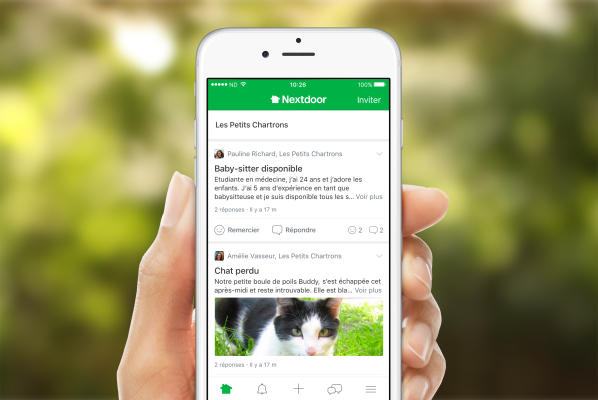After a slow and steady expansion across the U.S., social platform Nextdoor is now launching its fourth country outside of its home country. Nextdoor is a sort of tiny Facebook for neighborhoods. It’s a good way to connect with your neighbors, exchange tips, buy and sell things and more.
“The launch of Nextdoor in France represents a critical step in our continued European expansion. The value in connecting people to what matters most to them locally transcends national boundaries, and we are thrilled that our initial tests were received with great enthusiasm,” Nextdoor co-founder and CEO Nirav Tolia said. “We look forward to playing a role in helping neighbors across France utilize Nextdoor to make local connections every day that strengthen communities.”
On paper, Nextdoor sounds like the perfect platform for sprawling suburbs in the U.S. But the company thinks big European cities are also going to use it. That’s why the company is now live in the Netherlands, the U.K., Germany and now France.
Nextdoor users buy and sell desks and bikes, find babysitters and veterinarians, get together for block parties or to run together. If you’re looking for a drill or you’ve lost your dog, maybe other Nextdoor users can help you.
You need to reach a certain scale to turn Nextdoor into a useful platform. The company knows how to launch new neighborhoods with enough users to make them come back and find the service useful. So you can expect to see ads and flyers in the coming weeks.
The startup is still much bigger in the U.S. than in Europe. There are over 165,000 active neighborhoods in the U.S., which represents 80 percent of U.S. neighborhoods.
Each neighborhood has 1,200 households on average. So that means Nextdoor has millions and millions of users. And the company has raised hundreds of millions of dollars in total. With that much funding, it’s going to make it easier to compete with Mesvoisins in France.
People are getting tired of general purpose social networks, such as Facebook. The backlash is real, and it’s a good opportunity for smaller, more focused social networks. There’s also a feel-good effect with local connections. It’s nice to see your neighbors helping each other instead of your angry uncle sharing Donald Trump speeches.
[gallery ids="1593015,1593014,1593013"]
